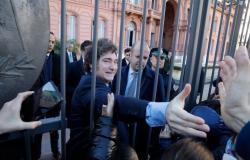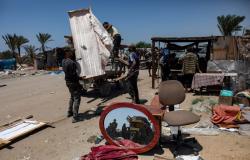lhe elections to renew the Parliament of the European Union (EU) are experiencing their decisive day this Sunday, with the vote in the majority 27 countries of the bloc and the perspective of a strengthening of the extreme right in the old continent.
(See also: European Parliament Voting: why is the old continent going to the polls with the balance tilted to the right?)
The most populated countries in the EU, Germany, France and Spain, opened their voting centers in the morning. Italy began its voting on Saturday, but will close the polls on Sunday afternoon.
In France, projections at local noon indicated a participation level of around 19.81%, very slightly above the 19.26% that had been recorded at the same time in the 2019 elections.
Germany is the country that will elect the largest number of Eurolegislators, with 96, followed by France (81), Italy (76) and Spain (61). Malta, Luxembourg and Cyprus will choose 6 each.
Participation in the European elections falls almost 7 points in Spain in the middle of the day
Participation in Spain for the European elections this Sunday stood at 28.01% at 2:00 p.m. local time (4:00 p.m. GMT), 6.73 points less than in the 2019 European Parliament elections, according to data provided by the Spanish government.
The data is compared with 2019 when the European Parliament elections coincided with the regional and local elections in Spain, so there may be a distortion in the comparison of participation, according to what the Secretary of State for Communication said in an appearance before the media. Francesc Valles.
Sunday’s election day passes without incident at half-time in the EU
The first part of the election day this Sunday passed normally and without incident in the countries of the European Union, where more than 370 million Europeans are called to vote to elect the 720 deputies of the European Parliament.
When the polls close in Italy this Sunday, at 11:00 p.m. local time (9:00 p.m. GMT), four days of European elections will conclude (from June 6 to 9), the second with the most voters in the world, after those in India.
The first results in Austria
The opposition ultranationalist party FPÖ won the European elections in Austria this Sunday, with 27% of the votes, ahead of the ruling Christian Democratic party ÖVP, with 23.5%, according to the trends projection presented by public television ORF.
First results in Germany
German Social Democrats defeated in European elections, the right in the lead, according to exit polls
720 seats in the European Parliament are at stake.
Photo:Getty Images
What are the projections?
Meanwhile, the Renew Europe bloc (Renew, centrists and liberals) should remain the third most important, although weighed down by the advance of the right and the extreme right.
Polls indicate that far-right parties could obtain up to a quarter of the seats, to the point of threatening the Greens bench.
View of the European Parliament.
Photo:Stephanie Lecocq. EFE
What do these elections mean?
This Sunday’s result will redefine the EU’s political map for the next five years as the bloc faces issues such as the war in Ukraine and trade negotiations.
How are coalitions formed in the European Parliament?
The seven groups of the outgoing European Parliament could gain or lose both deputies and country delegations, and could even disappear or mutate into other new families.
The rules establish that, to create a political group, there must be a minimum of 23 deputies and include party representatives from at least a quarter of the EU countries.
With the groups in principle defined and the Parliament already constituted, the 720 MEPs will have in their hands the first major decision of the legislature: reject or approve the candidate to preside over the European Commission designated by a qualified majority by the presidents and prime ministers of the EU. .
If there is no agreement in July, the investiture would be attempted again in September (either that of Von der Leyen, who has run for a second term, or that of another candidate), and in October and November The European Parliament should endorse or reject the names of all European commissioners.
Ursula von der Leyen, president of the European Commission.
Photo:EFE/EPA/STEPHANIE LECOCQ
These are the main institutions of the European Union
European Parliament
The Parliament that emerges from this week’s elections will have 720 legislators, fifteen more than in the last legislature.
Lawmakers negotiate texts with member states, represented by the European Council, before their final adoption. The Commission also participates in these debates.
MEPs also vote on the EU’s multiannual budget and support international agreements, particularly trade agreements.
The seat of parliament is in Strasbourg, France, where plenary sessions are held 12 times a year, but work continues through committees and also shorter sessions in Brussels.
European Comission
Headquartered in an imposing building in Brussels, the Commission is also the EU’s powerful antitrust regulator, with the power to investigate violations of competition rules and impose heavy fines.
It is made up of the Presidency and a cabinet of 27 ministers (one per country), which is officially called the College of Commissioners. It is estimated that around 32,000 people work for the Commission daily.
The majority caucus of the European Parliament elects the President of the Commission, although the bloc’s heads of state or government must then approve the decision.
The current president is the German conservative Ursula von der Leyen, who has held the position since 2019 and is seeking a second five-year term.
One of the European Commissioners – the “High Representative” – acts as the bloc’s head of diplomacy and coordinates positions with the member states on foreign policy matters. The position is currently held by the Spanish Josep Borrell.
European Council
They define the bloc’s political objectives, often handle the most politically sensitive issues and reach agreements on other issues when ministers cannot reach an agreement.
Its importance has increased as the EU has faced crisis after crisis, including the 2022 coronavirus pandemic and Russia’s attack on Ukraine in 2022.
Council of the European Union
For example, the 27 ministers of Foreign Affairs, Defense, Environment, as well as the other portfolios, meet periodically in Brussels or Luxembourg.
This institution is often confused with the Council of Europe, a human rights watchdog based in Strasbourg, France, but not part of the EU.
Each EU country holds the rotating presidency of the EU Council for six months. In the first half of this year the presidency of the Council is in the hands of Belgium, and in the second half it will be Hungary’s turn.
Some decisions can be approved by this Council with a qualified majority of 15 of the 27 EU countries, representing at least 65 percent of the bloc’s population, but questions on foreign policy or taxation require unanimity.
*With AFP






